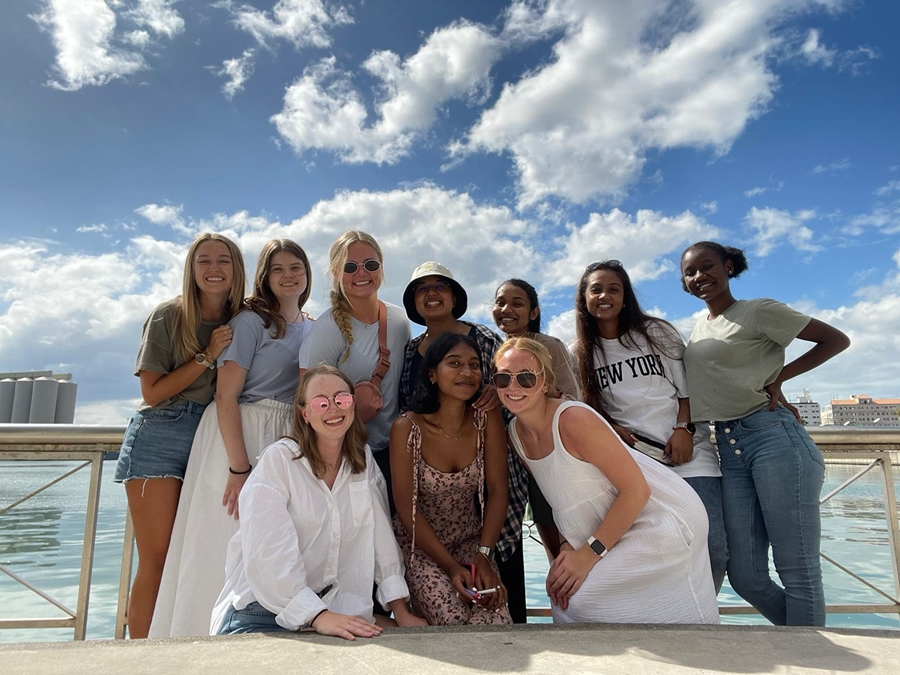U of A students are not only experiencing transformational opportunities while studying abroad, they're making the world a better place by helping other countries solve pressing challenges.
One of those countries is Mauritius, an island just over 1,000 miles east of Africa that is suffering from inflation and food insecurity among some of its residents due in part to the COVID-19 pandemic. Not only that, but the country must also shift its food production from sugar cane — which it has historically relied upon — to a more lucrative industry given the globalization of the sugar cane market.
"Mauritius is a former French and British colony, and that was the outpost for making rum in the south Indian Sea," said Lawton Nalley, professor of agricultural economics and agribusiness. "As such, the only thing they invested in was sugar cane. So the entire island was focused on sugar cane production. But they can't make money on it anymore because the market is too competitive. So we focused on what are other options that producers could do outside of sugar cane production."
In response, five U of A students from the agricultural economics program traveled there this summer as part of a U.S. State Department grant to conduct research into food security among Mauritians and a feasibility study on if residents would be open to drinking more fresh milk, a market the country is exploring to replace sugar cane.
"In Mauritius, no one drinks fresh milk because there's no cattle, so it's all powdered," Nalley said. "What if we could supply fresh milk? There should be a built-in market for that. So we were running surveys all across the island trying to get the temperature of people of, would they even drink fresh milk?"
Nalley applied for the grant with the Department of State following a request from the Department of Agriculture in Mauritius requesting a feasibility study around fresh milk. While they are still analyzing the results of the study, one major finding revealed that Mauritians were receptive to drinking fresh milk but still had concerns around it.
"People are still hesitant to drink it for a litany of reasons," Nalley said. "Just think about in the U.S., how easy it would be to get sick on milk. In Mauritius, that's a huge barrier to overcome. I think people are open to it, but it would take a governmental campaign and governmental regulations that really reinforce, 'This is safe.'"
The study also represented a two-birds-with-one-stone effort to not only provide meaningful learning opportunities for students, but to help other countries as part of the U of A's commitment as a global university.
"We want to make sure we're helping the people of those countries and not just helping our students," Nalley said. "It's synergetic."
U of A students partnered with students from the University in Mauritius in traveling across the island to survey residents on if they wanted to drink fresh milk — an experience that was almost entirely led by the students.
"These students created these surveys themselves, with input from myself and Dr. Amy Farmer. In the Walton College, we paired them up with Mauritian students and cut them loose," Nalley said. "So, they would ride a bus every day and go to every corner of the island with these Mauritian students and get these interviews. It was very much student-owned."
"You're your own boss, and your success is going to be a function of your own work ethic," Nalley continued. "It was just so great to see them take ownership and ride a bus for two-and-a-half hours to go interview 40 people and two-and-a-half hours back."
For graduate student Juliann Phillips, the internship was an invaluable opportunity to apply her learnings in agricultural economics. "It was a very hands-on internship. You're not in classes or lectures," she said. The cultural immersion not only helped deepen her understanding of economics but develop her communication and problem solving skills as well.
"You can do an agricultural internship in the U.S., but nothing compares to just what a different setting international work is," she said. "It enhances not just your soft skills but learning objectives such as how markets work in other communities and countries, and how culture affects markets."
"Learning about how to communicate to people who don't speak English and getting around a bus system in a different country — it develops a lot of skills that otherwise you wouldn't have developed," she added.
Beyond the academic experience, it opened Phillips' eyes to the similarities between herself and people of other cultures. She and her fellow students bonded with Mauritian students over music and food.
"They get there and meet kids their age and connect on social media," Nalley said. "It's funny how instantly that connection is made. Although they thought they had nothing in common, they found out they had 99 percent of their lives in common."
This story originally ran in the fall edition of the Razorbacks Worldwide newsletter, distributed to international alumni who are members of the Arkansas Alumni Association. For more information about joining the Alumni Association, visit their website.
Topics
Contacts
John Post, director of communications
Graduate School and International Education
479-575-4853, johnpost@uark.edu
